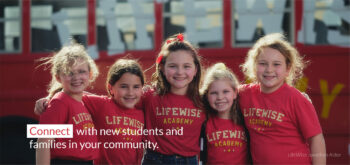Taking advantage of Supreme Court rulings allowing “released time religious instruction,” the group LifeWise Academy is carting kids off school grounds to receive Bible studies in an attempt to bring God back to school.
It was 1962 when prayer got dumped from public school by the Supreme Court at the instigation of flamboyant atheist agitator Madalyn Murray O’Hair. Grades, morals, behavior, and a sense of civic duty has been in decline ever since.
What was so offensive about prayer, recited along with the pledge of allegiance, at the beginning of the day?
 Here is the specific prayer the court prohibited: “Almighty God, we acknowledge our dependence upon thee, and we beg Thy blessings upon us, our parents, our teachers, and our Country.” The prayer in question was the “Regents’ Prayer,” which was composed by the New York State Board of Regents and recommended for use in public schools.
Here is the specific prayer the court prohibited: “Almighty God, we acknowledge our dependence upon thee, and we beg Thy blessings upon us, our parents, our teachers, and our Country.” The prayer in question was the “Regents’ Prayer,” which was composed by the New York State Board of Regents and recommended for use in public schools.
Now, Joel Penton, who hunted down quarterbacks as the defensive tackle of Ohio State University, is bringing God back to school, all in accordance with the legal doctrines outlined by the Supreme Court.
Since 2018, he’s been promoting the establishment of LifeWise Academy groups. So far, they are operating in 300 schools (representing 35,000 students) in 11 states. When the Ohio-based non-profit opens a study in a school, attendance improves, discipline improves and studies improve, according to a study conducted by Thomas P. Miller & Associates.
 “LifeWise has made a positive impact on students’ attendance, behavior and social emotional well-being,” the study quotes Central Ohio Principal Shalonda Likely-Roach. “It provides confidence and a sense of belonging for students. They have learned compassion.
“LifeWise has made a positive impact on students’ attendance, behavior and social emotional well-being,” the study quotes Central Ohio Principal Shalonda Likely-Roach. “It provides confidence and a sense of belonging for students. They have learned compassion.
“Our school’s average daily attendance goal is 90% or above each day,” Likely-Roach adds. Consistently, on the day when students participate in LifeWise, attendance improves. Disciplinary infractions for students who participate in LifeWise have also decreased significantly.
As expected, militant atheists are up in arms. The Freedom From Religion Foundation fired off 600 letters of complaints to school districts in Ohio to oppose the program. “Participating students are being punished by losing hundreds of hours of academic instruction to LifeWise’s released time bible study classes,” says FFRF Co-President Annie Laurie Gaylor, as quoted in Christian Post.
“If parents want their children to learn about the bible, there are so many ways to do it without cutting into valuable school hours,” she added. “The released time program involves a public school allowing students to attend religious instruction during school hours, provided that it is off-campus and not directly endorsed by the school itself.”
A mother of two students in LifeWise, Jessica Cappuzzello, doesn’t see anything wrong with the program. “I have seen firsthand differences in my boys that I kind of never thought possible,” she told NBC News. Her kids are in the New Albany-Plain Local School District outside Columbus.
 Vincent Coleman, a former middle school principal, concurs. A former school administrator of two decades in Columbus City Schools, Coleman wanted to do more to help the thousands of African-American and Latino students from disadvantaged homes. But rules banned him from talking about God to kids who needed hope, battled malnutrition, lived in homelessness, and struggled with mental health.
Vincent Coleman, a former middle school principal, concurs. A former school administrator of two decades in Columbus City Schools, Coleman wanted to do more to help the thousands of African-American and Latino students from disadvantaged homes. But rules banned him from talking about God to kids who needed hope, battled malnutrition, lived in homelessness, and struggled with mental health.
Now he runs a LifeWise program with 500 kids. “You can communicate to a kid that ‘Hey, your life matters. God loves you,’” Coleman said. “That’s a component that our kids need to hear.”
LifeWise kids wear distinctive red T-shirts to school on days when they have a LifeWise group. After math, English, history and other subjects, they board a bus – still during school hours – and ride to an offsite location (usually a church).
At the group, they sing to Jesus, get a Bible lesson, play games, and eat treats.
 In accordance with Supreme Court rules, a LifeWise program must be privately-funded and be hosted off the school grounds, must not be promoted by school officials and parents must sign an authorization for their kids to participate.
In accordance with Supreme Court rules, a LifeWise program must be privately-funded and be hosted off the school grounds, must not be promoted by school officials and parents must sign an authorization for their kids to participate.
The students who stay behind at the school and do not participate in LifeWise often go to the library to read books or engage in other learning programs.
Since supreme Court rulings in 1948 and 1952 establishing guidelines for “release time,” religious programs have popped up across the country. Mormons and Jews have been the biggest groups to take advantage of the ruling, usually in Utah or New York City, says Steven K. Green, a professor of law and religious history at Willamette University.
“For the most part, these were mom-and-pop type operations,” Green said. “Locally oriented, locally run.”
LifeWise is different because they provide a blueprint for anyone who starts a program anywhere in the country. The franchising-like model has detonated an explosion of revival.
“It’s just a matter of people becoming aware that this is really possible and then giving them the tools,” Penton says. “I think parents by and large have always wanted this as part of their kids’ education.
“What other hope do we have,” Penton said, “but to inject the word of God into the hearts of the next generation?”
If you want to know more about a personal relationship with God, go here
About the writer of this article: Jonathan Valenzuela lives in Los Angeles and studies at the Lighthouse Christian Academy.





S0 glad for children to learn of Jesus! The children who attend these classes should be encouraged to share what they learned to the ones whose parents wouldn’t let them go.
Comments are closed.